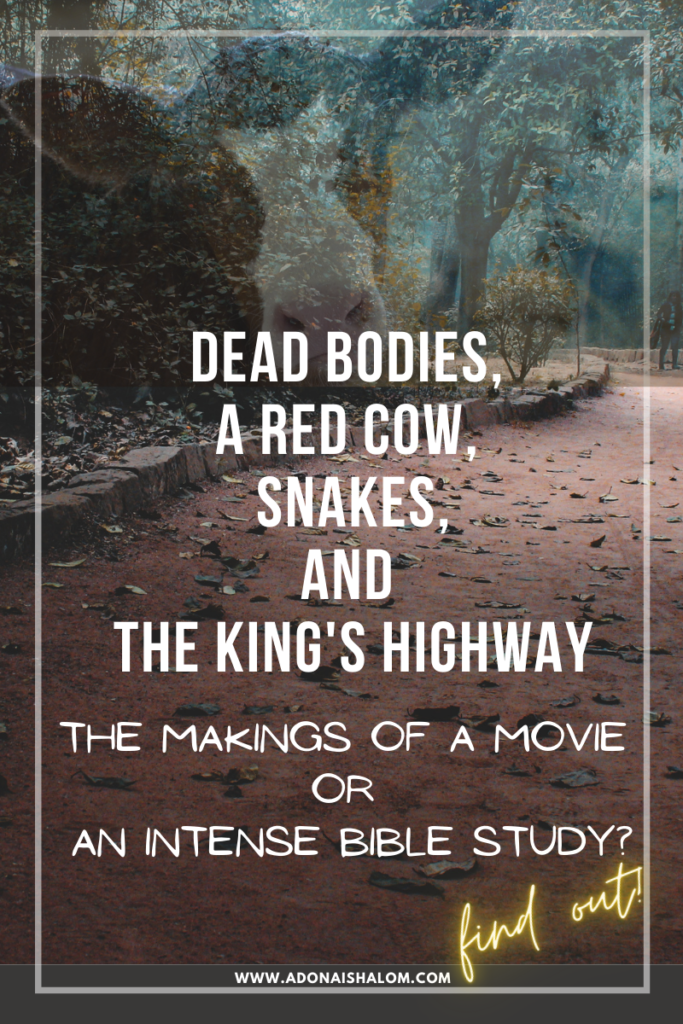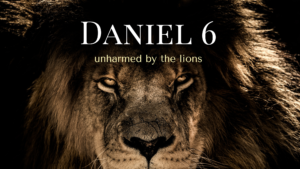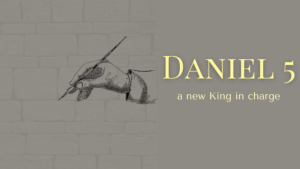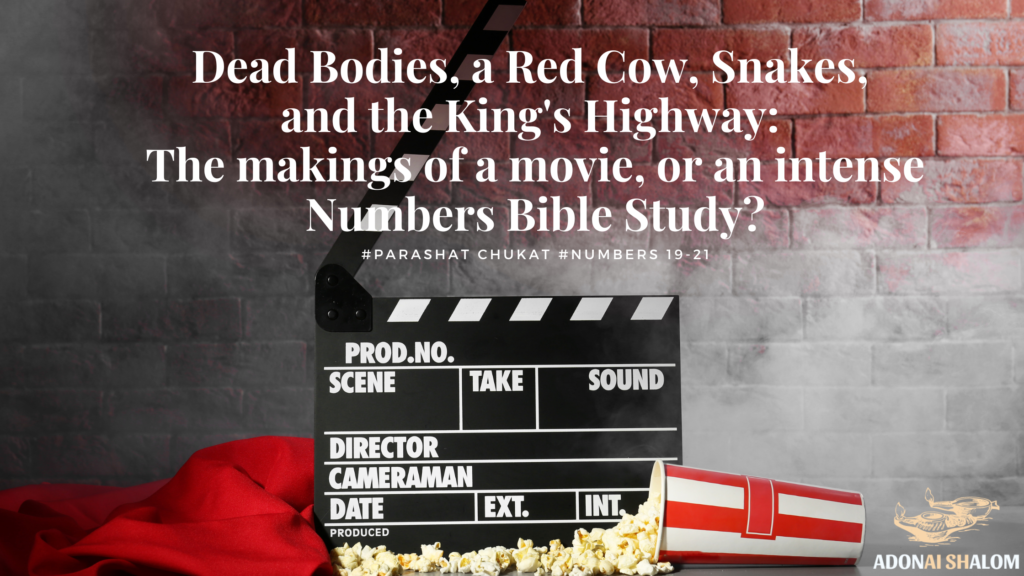
Parashat Chukat (B’midbar/Numbers 19-21) 5781 B”H (Updated 7/15/22 5782)
We continue our study through Numbers today.
Most people probably don’t count the passages of Scripture in Numbers 19-21 (known as Parashat Chukat) as among the most understandable or relatable of the Bible.
This portion of Scripture definitely won’t be the favorite of anyone uncomfortable with dead bodies!
The Red Heifer and Bible Prophecy
These chapters talk about a red heifer that is to be burned so that, mysteriously, its ashes can purify an unclean individual who has touched a dead body. Specific instructions are given about how to be purified if you’ve touched a corpse, what to do if an open container without a lid fastened on was in the tent when someone died there . . . lessons on decontamination, in a sense. Relatedly, the origins of medical advice, quarantines, and cleanliness are all rooted in Torah: even the serpent symbol used today by the medical community was loosely inspired by Moses’ bronze snake in Numbers 21:9.
The puzzling role of the red heifer that is described in Numbers 19 is a source of much debate surrounding the Third Temple and the fulfillment of end times prophecy. PBS Frontline has an interesting article in its Apocalypse series describing some of the issues around the red heifer in modern context titled, “Forcing the End: Why do a Pentecostal cattle breeder from Mississippi and an Orthodox Rabbi from Jerusalem believe that a red heifer can bring change?” Perhaps you will find it interesting reading, along with an article humorously titled, “In Quest of the Holy Cow” from Israel my Glory.
While red cows exist, they have not existed in Israel until very recently, 2018 to be specific. That means that for over 2,000 years, there was no red heifer anywhere in Israel. CBN news reported on the 2018 red heifer and since then, there have been other candidates. Ever heard that Crystal Lewis song, “People get ready, Jesus is coming?” Yeah. It’s true. He’s coming back! Get ready.
LINK: Holy cow! Prophecy fulfilled after red heifer is born at Temple of Israel
A stutterer told to talk . . . to a rock
While it is impossible for us to fully understand the LORD’s reasons for each instruction given in His Word, we can rest assured that He does have a reason for everything, even if we don’t understand.
Moshe (Moses) of all people, knew to obey God’s instructions, yet, on one famous occasion, he let his emotions get the best of him. When the people complained that they had no water to drink, ADONAI told Moshe to speak to a rock, and it would “give out its water” (Numbers 20:8, TLV).
In Numbers 20:10, Moses called the people “rebels” (an insult in their day) and pounded on the rock twice rather than speaking to it.
We generally assume this is because Moses was angry.
He might also have been extraordinarily nervous.
Speaking was not Moses’ forte. He stuttered – – – so the idea of talking to a rock in front of the entire nation of Israel was probably not something he was too eager to do.
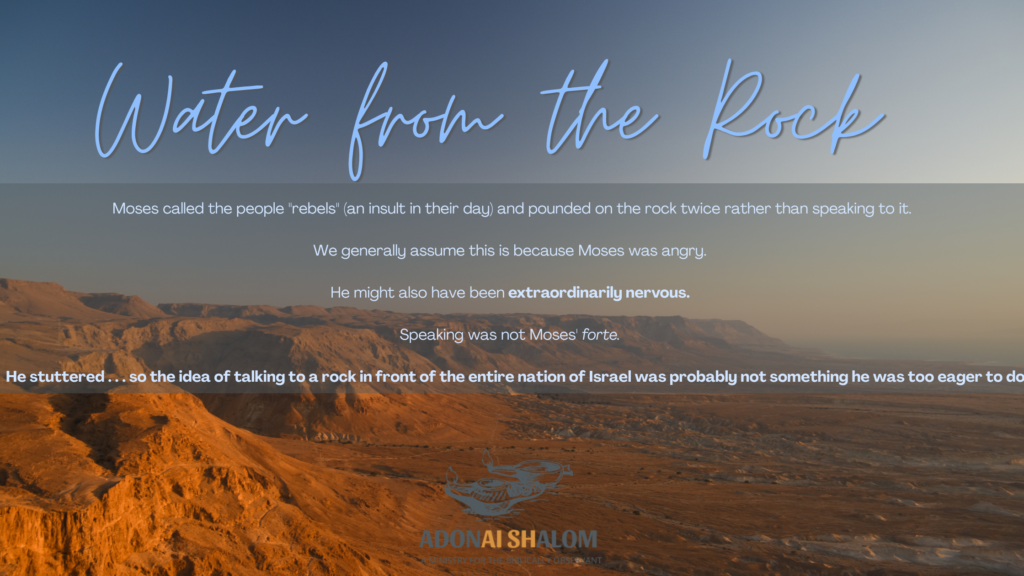
Was Moses indeed a stutterer? Neurologists and theologians don’t collaborate as much as perhaps they should, but an article in First Things looks at the evidence from neurological science that CONFIRMS the widely-held interpretation/assumption that Moses stuttered.
The LORD had his reasons for commanding Moses to trust Him and speak. The rock contained water and could respond to verbal command. What’s more, Jesus Christ the Anointed One, Messiah Yeshua, warned the Pharisees that rocks would cry out if the believers ceased from praising their Father (Luke 19:40). But ultimately, the command to speak to the rock in Meribah was not so much to prove that such a feat could be done as it was a test of faith! Moses failed to obey, and it cost him: he and that generation would not live to see the long-awaited Promised Land.
In any case, water did gush out of that rock, quite a sight to see.
Something out of a movie?
The LORD provides for the Israelites’ needs, but the people can’t seem to shake their grumbling addiction.
They complain there is no bread, no water, and that they are sick of manna.
By Numbers 21:6, ADONAI’s patience had grown thin. He sent poisonous snakes which started biting people and many died. God is long-suffering, so even after all of this He makes a way for healing and restoration. Moses is instructed to construct a bronze snake on a pole (nehushtan), which would provide healing whenever a bite victim looked at it.
So many supernatural occurrences! These accounts in the book of Numbers really seem like something out of a movie!
Unlike a movie, however; all of what is written in Scripture is completely true. The Author is your Creator, and He will be your Savior if you will turn to Him in faith!
The King’s Highway
If all of this wasn’t enough trial and tribulation, the Israelites had to traverse land that was controlled by enemies.
In ancient times, there was a highway that connected the north to the south for purposes of travel and trade. This highway was known as the “King’s Highway,” and it was rightly named, because different kingdoms controlled access to the main road.
The King of Edom would not allow Israel to pass through their territory, nor would King Sihon and Og of the Amorites.
Israel had to wage war.
Israel won and began to live in the land which had belonged to the Amorites.
Israel’s history is full of struggle and strife, but ultimately, Israel wins.
Today, as believers, we are part of Israel. We, too, have rebelled and fallen short of the expectations set out for us by the Word of God. Yet, in His infinite grace, mercy, and love, the LORD God of Israel has made a way for us.
We do not deserve permission granted to walk upon His Holy Road, but we walk the True King’s Highway, and He gives us victory along the way.
I am reminded of a hymn we sang growing up:
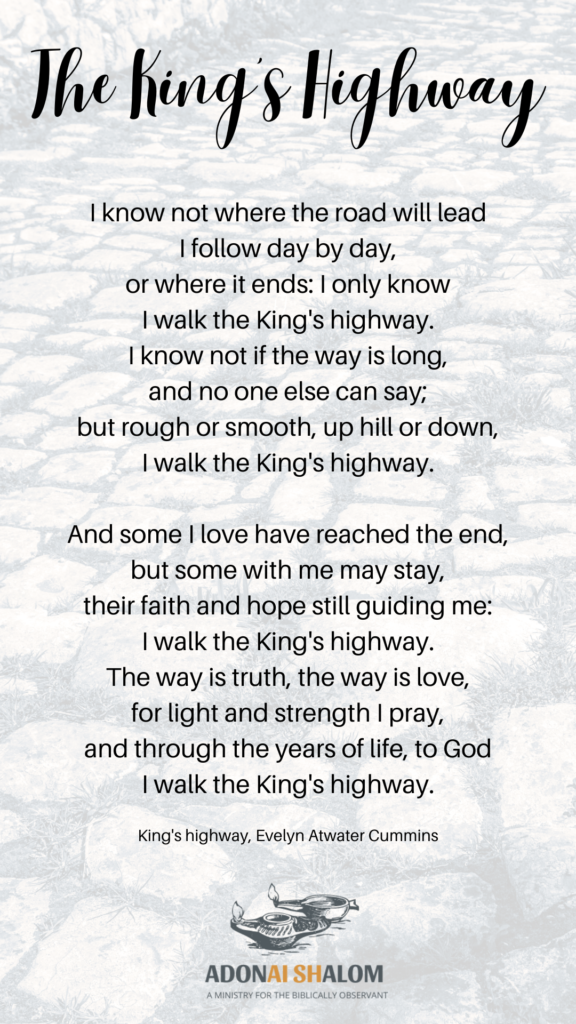
I know not where the road will lead
King’s highway, Evelyn Atwater Cummins
I follow day by day,
or where it ends: I only know
I walk the King’s highway.
I know not if the way is long,
and no one else can say;
but rough or smooth, up hill or down,
I walk the King’s highway.
And some I love have reached the end,
but some with me may stay,
their faith and hope still guiding me:
I walk the King’s highway.
The way is truth, the way is love,
for light and strength I pray,
and through the years of life, to God
I walk the King’s highway.
Thanks for reading! Let’s continue walking along our King’s Highway together as we study the book of Numbers together! What strikes you as most interesting from this passage? Please leave a comment and consider joining our email list or sharing with your friends! Shalom!
